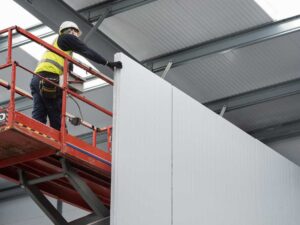Cold Room Construction Training: Is it Important?
The Importance of Training in Cold Room Construction
The construction of cold rooms is a highly specialised field within the broader realm of building and construction. Cold rooms are essential in various industries, including food storage, pharmaceuticals, and research laboratories, where precise temperature control is crucial. Given the critical nature of these facilities, proper training for those involved in their construction is paramount. Here, we delve into the importance of training in cold room construction and how it impacts quality, safety, efficiency, and regulatory compliance.

1. Ensuring Structural Integrity and Thermal Efficiency
Cold rooms must maintain specific temperatures consistently, often in environments where deviations can lead to significant losses or compromised safety. Training ensures that builders understand the materials and techniques required to achieve optimal insulation and prevent thermal bridges, which can undermine the room’s efficiency. Skilled workers are adept at selecting and installing insulation panels, doors, and refrigeration systems that maintain the necessary thermal environment.
2. Compliance with Regulations and Standards
Cold room construction is governed by stringent regulations and standards to ensure safety and efficacy. Proper training equips construction professionals with the knowledge of these regulations, such as those outlined by the International Institute of Refrigeration (IIR) and local building codes. Compliance is not only a legal requirement but also a critical factor in maintaining the integrity of stored goods, especially in industries like pharmaceuticals, where temperature control is vital for product efficacy and safety.
3. Enhancing Safety Protocols
Working with refrigeration systems and insulation materials involves specific safety risks. Trained professionals are aware of these hazards and are equipped to handle them safely. They understand the importance of proper ventilation, safe handling of refrigerants, and the correct use of personal protective equipment (PPE). Training programs often include modules on emergency procedures and first aid, which are crucial in preventing and managing accidents on-site.
4. Improving Efficiency and Reducing Costs
Well-trained workers are more efficient and effective in their roles. They can identify potential issues before they become problems, reducing the likelihood of costly repairs and downtime. Training ensures that workers are proficient with the latest tools and technologies, which can streamline the construction process and enhance the quality of the final product. An efficient build not only saves time and money but also minimises waste, contributing to more sustainable construction practices.
5. Meeting Customer Expectations and Enhancing Reputation
For construction companies, the ability to deliver high-quality cold rooms is a significant competitive advantage. Trained professionals can meet and exceed customer expectations by delivering projects that are reliable, durable, and efficient. This level of service enhances the company’s reputation, leading to repeat business and referrals. In industries where precision is critical, such as pharmaceuticals or high-end food storage, the assurance of well-constructed cold rooms is invaluable.
6. Keeping Up with Technological Advances
The field of cold room construction, like many other areas of construction, is continually evolving with new technologies and methods. Ongoing training ensures that construction professionals stay current with the latest advancements, from more efficient insulation materials to advanced temperature control systems. Staying ahead of technological trends allows companies to offer state-of-the-art solutions that can better serve their clients’ needs.
Conclusion
Training in cold room construction is not merely an added benefit; it is a fundamental component of ensuring that these critical facilities function as intended. From maintaining thermal efficiency and complying with regulations to enhancing safety and operational efficiency, the benefits of well-trained construction professionals are manifold. As industries continue to rely on precise temperature control for their operations, the demand for expertly trained cold room construction workers will only grow. Investing in comprehensive training programs is a strategic move that pays dividends in quality, safety, customer satisfaction, and overall success in this specialised construction niche.

